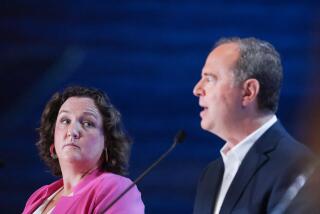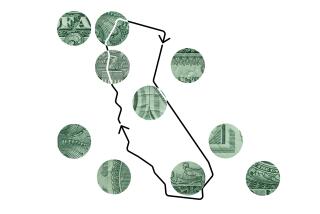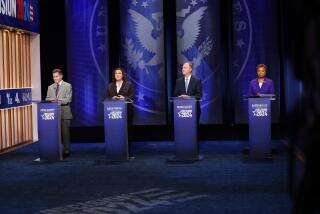Germany’s Kohl Rejects Bribery Allegations in Tank Sale
- Share via
BERLIN — Former Chancellor Helmut Kohl stepped into a bribery and campaign-finance scandal Monday to deny any ulterior motives for his government’s approval of a major arms sale to Saudi Arabia in 1990, including a $530,000 donation to his political party that prosecutors say went astray.
The controversy, which has been mounting in Germany for the past three weeks, also may have played some role in the sudden illness of Kohl’s successor as leader of the Christian Democratic Union. Wolfgang Schaeuble collapsed Monday in his Berlin hotel room shortly after a CDU news conference to discuss the affair and was rushed to a hospital.
Party General Secretary Angela Merkel told reporters that the 57-year-old Schaeuble, who has been in a wheelchair since an assassination attempt nine years ago, was conscious and recovering by late evening from what was thought to be a gallbladder or bile problem.
Although Kohl and the CDU lost power to Chancellor Gerhard Schroeder’s Social Democrats and the environmentalist Greens a year ago, the party had been enjoying a rebirth through a string of state and regional election successes before being hit by bribery allegations earlier this month.
Authorities in the Bavarian city of Augsburg issued arrest warrants for former CDU Treasurer Walther Leisler Kiep and a German arms dealer, Karlheinz Schreiber, on Nov. 4. That occurred a few weeks after officials announced an investigation into the propriety of a $2-million payment to another Kohl-era official, Ludwig-Holger Pfahls, a former deputy defense minister, in a separate incident.
“It is incomprehensible to me how anyone could concoct bribery allegations from any decision I made as chancellor,” Kohl told reporters. “This is one of the most evil accusations I’ve heard in years.”
Kohl said he approved the sale of 36 tanks to Saudi Arabia because the United States had asked Germany to help in the buildup to the Persian Gulf War against Iraq. The German public was ardently opposed to any involvement of Bundeswehr troops in a foreign conflict.
German media reported that the manufacturer received 400 million marks, or $210 million, for the tanks.
Speeding up the weapons deal arranged by Schreiber through an arms-manufacturing subsidiary of Thyssen seemed like a way for Germany to help U.S. allies, Kohl said.
Kohl said he had no knowledge of a 1-million mark ($530,000) contribution made by Schreiber to Kiep and another CDU official, and party account records show no such deposit.
Schaeuble reiterated last week that the contribution, which Schreiber listed on official reports, never made it into the party’s donations account. He promised a thorough review of the party’s record-keeping and financing practices.
Kiep, who now heads the Atlantic Bridge organization, which fosters closer trade and cultural ties with the United States, cut short a U.S. visit and flew back from Los Angeles to respond to the arrest warrant issued on suspicion of tax evasion. He remains free on bail. Schreiber is reported by German media to be living in Canada.
Although no formal charges have been filed against any of the former officials, the accusations have inspired a frenzy of political posturing.
Late Monday, the Social Democrats unanimously approved formation of an investigative commission to look into the affair, said Peter Struck, a party parliamentary leader.
Schroeder told journalists at a late-night news conference that he considered the commission an appropriate response to the scandal, but he declined to take any political advantage. “Such matters don’t damage just one political party but our society as a whole,” he said.
German President Johannes Rau has announced that he will set up a special commission to review the country’s political party financing practices.
Germany’s party financing regulations were revised five years ago, but analysts contend that there is still too much latitude for bribery and corruption and that personal financial disclosure needs to be required of top government officials.
Carel Mohn, regional officer for Germany of Transparency International, an anti-corruption watchdog agency, applauded Rau’s suggestion of a more thorough review of officials’ finances and potential conflicts of interest.
“Germany can learn something from other countries that have adopted anti-corruption mechanisms,” Mohn said, pointing to wide-ranging internal reforms of the European Commission undertaken since damning allegations of corruption in the Brussels hierarchy forced resignation of the entire commission this spring.
Schaeuble and other current CDU leaders say they need more time to look into the matter. But German media claim the party has for years maintained a secret account for donations that it prefers not come to public attention.
More to Read
Sign up for Essential California
The most important California stories and recommendations in your inbox every morning.
You may occasionally receive promotional content from the Los Angeles Times.












